The Holocene Extinction Part 1: Death by Human
Right now, over 10% of all the species on Earth are facing potential extinction over the course of the 21st century. It's known as the Holocene Extinction event. One in ten species- that's insane. The current rate of extinctions is over 1000 times background levels. And it's all caused by human activity.
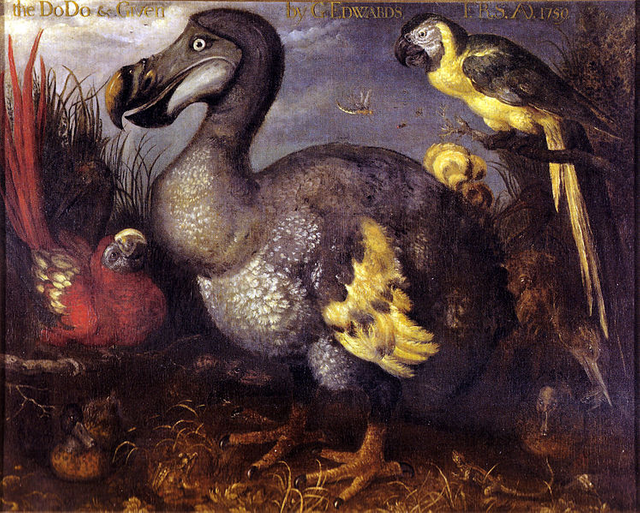
The Dodo, driven extinct by humans by 1662. [Image source]
The numbers go a bit wobbly after the 21st century- as more and more species go extinct, food webs and ecosystems begin to break down. Ecosystems are a classic example of complex systems- the elaborate feedback mechanisms and unpredictable results of force applied to a complex system (in this case extinction)- produce profoundly unpredictable results. We don't know how bad it's going to get- just that it's going to be really, really bad. It's not to the level of the great mass extinctions, thankfully. The worst of those, the Permian extinction, killed well over 90% of all species living on Earth today. Many of the rest killed well over 70% of living species. Still, though- the human mass extinction is huge. It will be taking the #6 spot on the list.
One of the biggest tragedies of this extinction event is watching as a species becomes doomed. Bringing a species to extinction isn't just a matter of killing off the last survivor. Species have a minimum viable population. Drop below that number, your species will be incapable of maintaining sufficient genetic diversity or even replacing dying members of your species. There are plenty species on the planet right now that are essentially extinct yet still walking around.
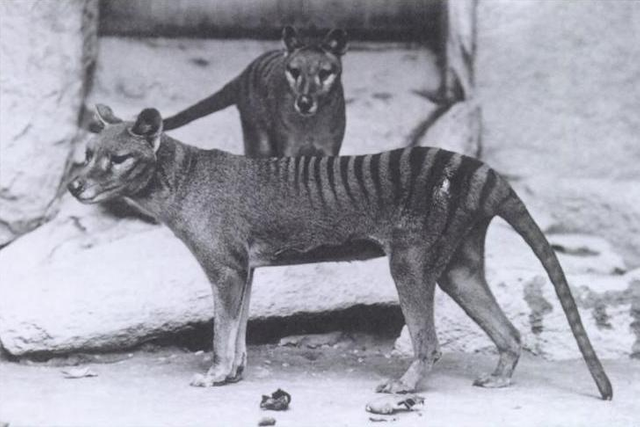
The thylacine, or Tasmanian Tiger. Declared extinct in 1936. [Image source]
How exactly are we doing so much damage? Well, there are, unsurprisingly, quite a few ways. First off is reproductive pressure. There are, when it comes down to it, two major reproductive strategies. First, you can produce massive amounts of offspring, abandon them to their own devices, and wager on enough of them reaching adulthood. Second, you can have a smaller amount of offspring and lavish much more energy on them, vastly increasing the probability of their survival to adulthood. Up until recently, both were highly effective strategies. The latter, slower strategy often tends to produce much larger, deadlier creatures as well, which definitely helps them survive.
Then humans came along. Humans are unique in that they hunt absolutely anything and everything- even massive apex predators. Those adaptations that render them unkillable and unhunted as adults? They don't stop us. Plus, due to the greater calorie counts of larger creatures, we were- and still are- incentivized to go after the largest creatures around for food. We've discovered- through both real world observation and mathematical modeling- that it takes surprisingly little to wipe out a species relying on the latter strategy. When a species only produces one offspring a year, killing off a parent that might not only help that offspring survive but also produce more offspring in the future is a huge, huge deal. A species can be forced beneath its minimum viable population very quickly by what seem like fairly minor levels of killing by humans.
The effects of this can be seen particularly strongly in the oceans- over 90% of all large bony fish have vanished over the last century alone. It takes 18 times as much work to catch a pound of fish today as it did in the 1800s.
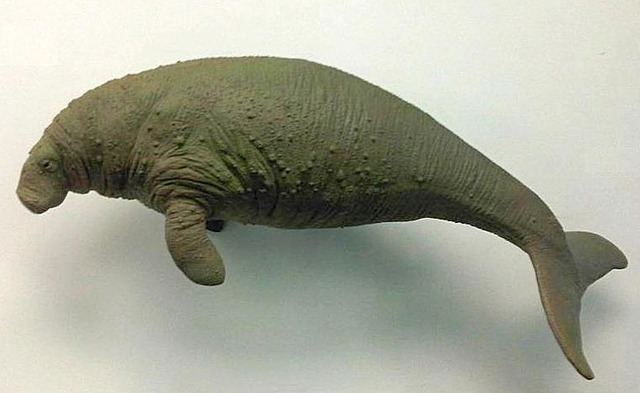
Steller's Sea Cow. Driven extinct by 1768, a mere 27 years after it was first encountered by Europeans. [Image source]
The next major cause of extinction is habitat loss. This one doesn't require too much detailed explanation- humans are really hungry for more room to grow. More room for our farms, more room for our cities, more room for our roads, more room for our golf courses, make room, make room! As we chop down the rainforest and drain the water from rivers, ecosystems get correspondingly smaller.
Those shrinking ecosystems, however, have an effect disproportionate to their loss of territory. I've discussed island biogeography several times before- it's the study of isolated populations and their evolution. One of the key insights of the science is the relationship between space and population stability. Any given territory can only support so much life- a predator that needs 40 square miles to hunt on can't survive on 20. So it seems intuitive that we'd lose some species as territory shrinks- but species loss is considerably higher than those numbers would indicate. What's happening, essentially, is that as the population shrinks with the territory, it becomes less and less resistant to random chance. When you have a huge population, a tsunami wiping out part of it probably won't end your species. When your population is tiny? Bye bye.
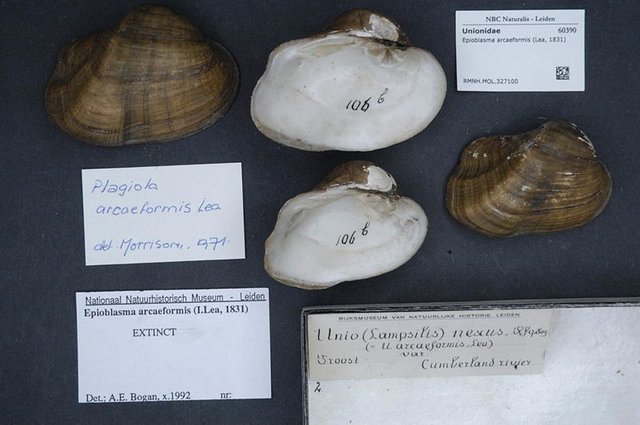
The Arc Formed Pearly Mussel. Already badly threatened, it was driven to final extinction by the construction of the Cherokee Dam in Tennessee in 1941. Most extinct species aren't flashy, interesting, or beautiful. [Image source]
Next is ecosystem decay. Ecosystems are carefully interwoven webs. Food chains, water distribution, symbiotic relationships, etc, etc- any healthy ecosystem could keep a dozen ecologists and numerous other biologists in work for centuries studying its intricacies. When species start to vanish from an ecosystem, though, the damage to the web starts to spread. The whole thing starts to unravel, and eventually the web just snaps apart.
Most of these ecosystem webs have a keystone species- one whose interactions dominate the rest of the ecosystem. Sometimes it's a large herbivore, sometimes an apex predator, sometimes it's a plant. When that species dies off, for whatever reason, the rest begin to crumple around them. Of course, it works the other way, too- kill off enough of the species that supports the keystone species, and it dies off, taking much of the rest of the web with it.
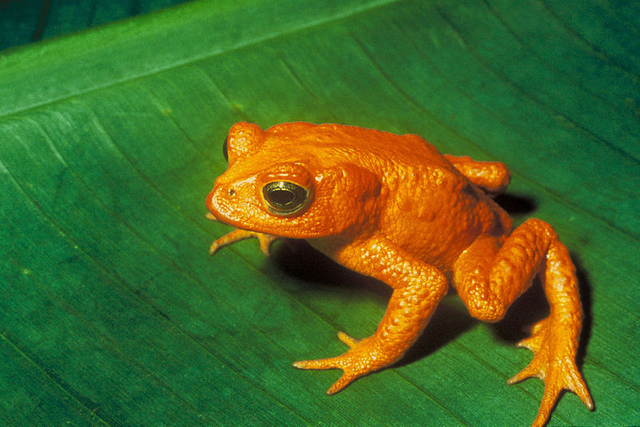
The Golden Toad. Discovered in 1966, declared extinct in 1989. [Image source]
I'd meant to cover all the ways in which we bring extinctions about in a single post before getting to other facets of the Holocene Extinction, but this one's already reached over a thousand words. Next time we'll move on to a few more modern causes of extinction.
Bibliography:
The Sixth Extinction, by Elizabeth Kolbert
The Song of the Dodo, by David Quammen
The Ocean of Life, by Callum Roberts
The Emerald Planet, by David Beerling
Wonderful Life, by Stephen Jay Gould
Full House, by Stephen Jay Gould
Life, by Richard Fortey
https://en.wikipedia.org/wiki/Arc-form_pearly_mussel
https://en.wikipedia.org/wiki/Extinction
https://en.wikipedia.org/wiki/Extinction_event
https://en.wikipedia.org/wiki/Holocene_extinction
https://en.wikipedia.org/wiki/List_of_recently_extinct_reptiles
https://en.wikipedia.org/wiki/Steller%27s_sea_cow
https://en.wikipedia.org/wiki/List_of_recently_extinct_bird_species
https://en.wikipedia.org/wiki/List_of_recently_extinct_plants
https://en.wikipedia.org/wiki/Golden_toad

The imbalance in the system is caused by greed and misuse of resources
It is not the growth of human activity. Nature is guided by its Creator with an intelligent system adapted to natural changes
Thanks for your search .. and more good work (waiting for Part 2)
Part 2 is up! https://steemit.com/science/@mountainwashere/the-holocene-mass-extinction-part-2-nonstop-invasions
Great article. This is why I've really been interested in the permaculture concept of ecosystem restoration. It provides hope that it is in fact possible to turn the tide one day through education of better farming techniques better for all participants involved, e.g. the incentives are properly aligned. Which is why we are all here on steemit right!
Permaculture is one of many effective strategies for mitigating our damage! Plus, it's just cool.
I wonder what would be left of humans, once the last creature has been processed into the last Oscar Meyer hot dog. Would man still be glued to his virtual display devises updating the latest stock or cryptocurrency value update? Would he then finally realize how he sold every important and sacred inheritance for virtual baubles that only exist in the imagination of fellow deluded humans? Maybe the Matrix was less about AI enslaving humans, but rather humanity's final solution, after having raped the planet into desolation. In the end, man would need to liquify the dead to continue his miserable existence, while continuing to "live" glued to his virtual wealth.
My grandfather was friends with the guy who wrote the Oscar Meyer jingle.
That would have been a much more satisfying twist to the Matrix than much of the actual lore.
Over 10% are facing extinction???
That's an understatement if ever there was one. The world's more badly polluted than it will ever have been and probably more inhospitable than it has been for most of its history save for the earliest conditions and when the asteroid hit the Yucatan that probably led to the extinction of the dinosaurs.
We're doing well. A relatively small number of pest species / species that thrive in urban areas are also doing well / very well for themselves. Domestic animals are doing fantastically. But the rest of life?
The seas are full of plastic and warming. They're over-fished. Amazonian rainforest is being slashed and burnt so that McDonalds can raise cattle. The increasing human population forever encroaches into areas of natural beauty as more people need more places to live. Idiots carry guns on the plains of Africa and shoot large mammals for fun.
This is a MASS EXTINCTION up there with the previous 5. Once - an extinction you refer to - 95% of species went extinct. Every other day, there'll be species as yet undiscovered being lost forever. There's thought to be several million species (a million beetles alone, for example). There won't be anywhere near that amount left by the time the planet's finished with the human species.
Of course, fine post otherwise. I just don't think we should be beating around the bush - so to speak - where predicted casualties are concerned.
It's in the same order of magnitude- double digit percentages- but it's thankfully not as bad as the previous extinctions. The Permian, the one that killed 90% plus of all species? That involved large sections of the crust ripping open, pouring magma across tens of thousands of square miles, polluting the atmosphere with toxic gases to a far worse degree than we have, and rendering all but the very top layer of the ocean entirely oxygenless. Even if we detonated all our nukes at once we wouldn't be anywhere close to that.
This extinction event really got moving when? A hundred years ago? Two hundred at most? Geologically speaking, if the history of the planet lasted a day, man's mission to exterminate life would be barely a fraction of a second in length, would it not?
No biological entity could ever come close to humankind's destructiveness. We're attacking life on every front. Seriously, you're underestimating the effect of our greed. And it's science-fiction hippy-bullshit if you can predict a greener human 100 years down the road. That'll never come to be whilst capitalism is king.
Of course, I hope you're right and I'm wrong. I just have no faith in humans pulling their heads out their asses whilst people like Donald Trump (and the rest) are in the world.
Also...
Imagine if the impoverished half of the world demand the trappings of wealth that the rich half have enjoyed for so long. As their nations eventually stop warring / their nations' economies begin to grow. If the developing world was no more and all nations could be regarded as being developed.
Is it racist to say they must not be allowed to develop their economies? (Is that what Western governments have been plotting against for so long?)
Because we're fucked if every African wants a fridge, a laptop, a telly and a car. And a nice house to live in.
Maybe trickle down economics will save the planet in the end? ;) ;) ;) (I personally hate the concept, ordinarily.)
I'm hardly predicting a greener future- merely pointing out that our destructive capabilities are still outmatched by the Earth's destructive powers. I- and extinction researchers of all stripes- have taken into account the insane speed at which we spread extinction. (We actually started arpund 10k years ago). The numbers still don't even approach the big extinctions. In fact, the speed at which we're moving is the main reason why we're causing these extinctions- if human pressures had been applied slower, far more species could have adapted.
As for whether your claim is racist- well, you were the one who brought that into the conversation, so I think that's one you probably have the answer to already.
Just like the theory of “islandization” when curting down trees in rainforests. They theorized if they left islands of trees standing that species would be protected. This turned out an utter failure. Insects would often leave when the desirable trees were gone. But even birds and other species would not follow them fearing to leave the cover of the trees. Birds would literally starve refusing to fly to the next “island”.
Said islands have, however, beem invaluable in terms of scientific research- we've gotten some of our absolute best data on local extinction and island populations from them. In fact, a large number are maintained to this day as research stations.
oof, unfortunately this is something I tend to dwell on. Fortunately I think it's easier than ever to educate ourselves about this stuff and start making changes (no matter how small and seemingly insignificant), but with that ease of knowledge it also unfortunately proves just how ignorant so many people choose to be about the whole thing.
I love posts like this, keep up the awesome work as usual!
Thanks, I appreciate the support! And yeah, I dwell on this stuff a lot too. :(
The difficult part is that humans seem to have a blind spot where statistics are concerned. Stories of individual species like you're doing here seem to be more effective. I thought The Hunter with Willem Defoe was a very effective movie.
Oh, we're terrible at statistics, yeah! It doesn't help that many educational systems around the world (including the US) do a terrible job with teaching statistics. Those personal stories are more fun to write, definitely.
I wonder when it’s our turn.
Great post!
Resteemed!
Now THAT is the big question.
I appreciate your article, @mountainwashere, although it makes me very sad to read it. I can remember as a young girl being shocked and saddened when I first learned that humans had caused the extinction of the Dodo. I distinctly remember that bird as being the first one I learned about. The Passenger Pigeon was the second one. I did a lot of research in the library on the subject for school.
I selected your article today because it is so important for us all to be aware of the dwindling numbers of so many creatures and plants. I've upvoted and resteemed this article as one of my daily post promotions on the @mitneb Curation Trail. This article will be featured in my daily curation report on 06 Jan 2018.
Cheers!
Thanks! And yeah, it's a profoundly depressing topic.
Hopefully this kind of information is taken more to heart of industries and ordinary people like us. More awareness is good but doesn't seem like it will be enough to prevent what is happening at the moment. People really should take this seriously and see their actions as impacting to world we live in. Especially considering, like you said, damaging one aspect of the ecosystem means indirectly affecting the other connections it has.